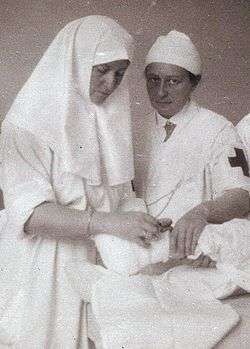Vera Gedroitz

Princess Vera Ignatievna Gedroitz[1] (Russian: Ве́ра Игна́тьевна Гедро́йц; IPA: [ˈvʲɛrə ɪɡˈnatʲjɪvnə ɡʲɪˈdrojts]; Ukrainian: Віра Ігнатіївна Гедройць; 1870–1932) was a Russian doctor of medicine, a professor, the first female surgeon in Russia, one of the first female professors of surgery in the world, and a writer of poetry and prose.
Gedroitz belonged to a Lithuanian princely clan which shared its origins with the more famous Radziwiłł family. She was born in Slobodishe (Oryol guberniya) into the Russian-speaking milieu and was trained to be a surgeon at the University of Lausanne, in the clinic of professor César Roux. The illness of her parents and the death of her sister compelled Gedroitz to return to Russia in 1900.
Her work in laparotomies during the Russo-Japanese War was among the first to achieve a high success rate. This led the Russian army to adopt the procedure, and caused the notions of the correct treatment of penetrating abdominal wounds to change.
In 1909 Gedroitz was transferred to the court hospital in Tsarskoye Selo, where she worked as a surgeon to the imperial family. At that time she joined the Poets' Guild, publishing her poems under the pen name Sergei Gedroitz.
After the February Revolution she did not flee the Tsarskoye Selo as many of her relatives did. She went to work on the World War I front, but settled in Kiev with her lover, Countess Maria Nierodt.[2]
Gedroitz actively worked and wrote scientific works on oncology, pediatric surgery, and endocrinology. In 1921 she started to teach at the Kiev medical institute. In 1923 she was selected for a post of the professor, in 1929 she headed chair of faculty surgery and was removed from the university in 1930.
She died of cancer and was buried in her native city.
References
External links
- Contributions to medicine
- Biography at narod.ru (in Russian)
- "Princess Vera Gedroits: military surgeon, poet, and author." BMJ. British medical journal [0959-8138] Bennett yr:1992 vol:305 pg:1532